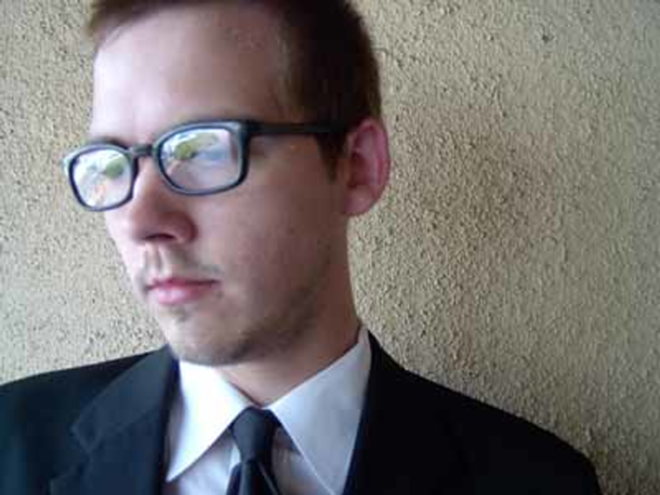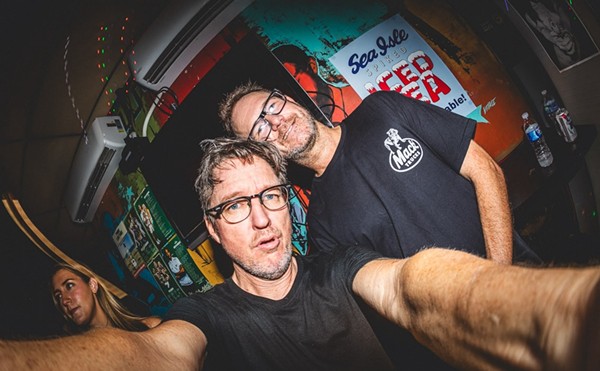
Thom Pain (based on nothing) is a howl of agony disguised as a monologue, a brilliant modernist poem about loss and despair, and nostalgia for the rare moments when the sun smiled and one was happy. Though actor T. Scott Wooten isn't a technically proficient artist, he's still able, following Julie Rowe's direction, to suggest the scattered mind and battered soul of the eponymous hero, who in his fragmented, indecisive way has a chilling tale to tell about mishaps, miscues and missed opportunities.
Wooten's Thom has been defeated too often to be hopeful, but he's still possessed of a few good memories that lend some brightness to his melancholy outcry. And he never forgets his audience: "When did your childhood end?" he asks conspiratorially. "How badly did you get hurt, when you did, when you were this little, when you were this wee little hurtable thing, nothing but big eyes, a heart, a few hundred words?"
And then Thom tells — in the midst of false starts, changes of direction and morbid jokes — of the most shattering episodes in his own short life. If it all sounds too lugubrious to make a satisfying night of theater, let me assure you that playwright Will Eno's language is winningly intelligent, and at many moments the play is profound and profoundly funny.
There are three events in Thom's life that matter to him most, and to which he returns at unpredictable moments. The first took place when he was a child in the rain wearing a cowboy suit, trying to write with a stick in a rain-puddle (impossibility intended). "The boy's beloved dog jogs toward him, daintily avoiding other yet-to-be-written-in puddles ... Then she lowered her head to lap water from a puddle and was electrocuted. A power line had come down and was lying frayed in the water. She was thrown some distance, flew like some poorly thought-out bird."
Wooten tells us of this disaster with next to no emotion, as if he long ago left sadness behind and now feels only numb. A few minutes later he's on to the episode of the bees — how on the morning after his dog died (and after he cut off half his hair and had a wet dream, among other occurrences), he was walking in a meadow and accidentally kicked a downed beehive: "They swarmed into his eyes and mouth, stung him on every skinny surface ...."
Third, Thom tells us of a relationship with a woman that went bad for multiple reasons (among them: he "lost himself" in her, and then she left when she couldn't find him). This is the hurt that is freshest in his mind, and somehow all of the others are contained within it. "I did everything in fear," he says. "What was I afraid of? I had promise. I don't have anything anymore."
Which isn't quite true: He does have an ingenious and uniquely expressive stage manner. He starts the play in utter darkness, for example, and makes us listen without seeing him. He breaks into poetic rhapsodies, then changes the subject. He suddenly turns from self-revelation to verbal assaults — "Trust me, there are people out there who don't love you" — and then he surprises us with observations that don't stop resounding: "She still had her tonsils, her appendix, her wisdom teeth, all the useless extra things."
Thom even tells us he has a rich interior life, and then enjoys it — in silence. He's sadistic (Wooten needs to emphasize this more), masochistic, terribly earnest and very damaged. He's like no one else in American drama. He's you, at your lowest moment. And he's worth getting to know, especially if you've ever felt "not really outfitted for this life, not properly clothed, not enough skin."
There's minimal production in this American Stage After Hours play, but it has near maximum stageworthiness, and will remind you that amid the dumbers-down and underestimaters, there are still playwrights in this country who are fiercely engaged with reality. Thom Pain may be "based on nothing," but his story has weight and substance. Think of it as a cautionary tale, a warning against indifference. In any case, buy a ticket.
![]()














